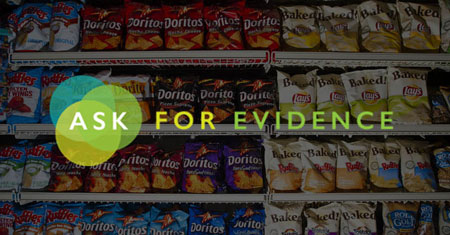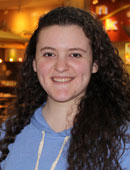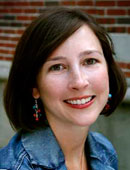Ask for Evidence spawns critical thinking

A new research endeavor supported by a donor-funded Consumer Awareness Project grant is helping Emerson students put on their critical thinking caps.
The Ask for Evidence Campaign is part of a national campaign to improve consumer awareness and truth in advertising. At Emerson, it has students in several different academic disciplines questioning and investigating claims made to consumers through advertisements, news reports, and expert testimony. They are using emails, phone calls, letters, data, and social media to attempt to research the validity of the claims, many of which are discovered to be misleading or unfounded.
Approximately 200 claims have been investigated by Emerson students—and in many cases, debunked—in the past few months.

“It made absolutely no sense,” said Olive Light ’16, who investigated an “antibacterial vacuum” advertised by Raycop, a Korean appliance company. “I’ve never heard of anything like that.”
For her class taught by Assistant Professor Amy Vashlishan Murray, Light emailed Raycop asking for evidence.
“I implied I was a customer talking to them,” Light said. “They basically re-stated information that was already on their website, which was unhelpful.”
At a dead end, Light said she was unable to find links to two studies that Raycop claimed proved its vacuum was antibacterial. Instead, she investigated on her own the UV-C light technology that Raycop said killed bacteria that touched its vacuum cleaners.
In her conclusion, Light found evidence, including a study by the American Society of Microbiology, which showed UV-C technology prevents new bacteria from forming—but does not kill bacteria, as Raycop claimed.
Vashlishan Murray, a molecular biologist who teaches scientific perspective courses relevant to health and human biology at Emerson, says Ask for Evidence can help students in a variety of academic fields and also develops important life skills.
 “In the sciences, it’s a way to teach research skills in terms of how to ask questions and what to be skeptical of,” she said. “But it’s a great fit for an investigative journalism class, for example, as well.”
“In the sciences, it’s a way to teach research skills in terms of how to ask questions and what to be skeptical of,” she said. “But it’s a great fit for an investigative journalism class, for example, as well.”
Vashlishan Murray says the campaign is open to anyone—not just Emerson students—who would like to question any type of claim made to consumers. Anyone can email or tweet to a claim-maker, or visit Ask for Evidence’s “how-to” web page or its resources page. The campaign encourages participants to use the Twitter hashtag #askforevidence.
“The big picture of the campaign is to raise the public demand for evidence,” Vashlishan Murray said. “When people start asking, claim-makers will start expecting to be asked for evidence.”
The campaign encourages participants to share their evidence and findings. Several Emerson students have posted their findings on the Ask for Evidence website, as well as through a variety of other formats, including podcasts, videos, comics, and songs.
Emerson is home to Boston’s Ask for Evidence Campaign, which is being conducted in collaboration with Voice of Young Science USA, a grassroots network of early career researchers. The campaign is modeled after a similar, successful one in England, which was also called Ask for Evidence. The British Ask for Evidence website offers a variety of tools to help participants get started.
That campaign was launched by Sense About Science, an international nonprofit organization that is aiding Emerson with its campaign.
Vashlishan Murray is overseeing the Ask for Evidence Campaign here at Emerson, which involves the collaboration of 14 interdisciplinary faculty members in the departments of Communication Sciences and Disorders, Marketing Communication, Communication Studies, and the Institute for Liberal Arts and Interdisciplinary Studies.
Categories